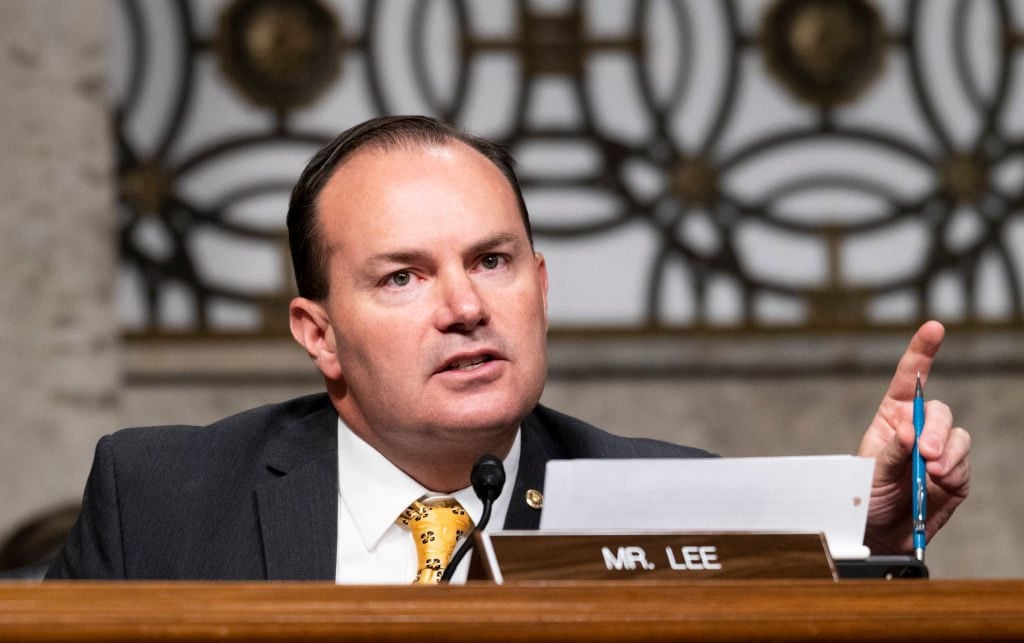Politics
A Single US Republican Senator Has Blocked the Approval of New Museums Dedicated to Women’s History and the American Latino
Mike Lee of Utah scuttled what other senators expected to be a simple vote.

Mike Lee of Utah scuttled what other senators expected to be a simple vote.

Taylor Dafoe

Amid a contentious debate on the floor of the US Senate, a single politician blocked the approvals of the proposed National Museum of the American Latino and the American Women’s History Museum on December 10.
Legislation for the creation of the new institutions, both of which would be under the umbrella of the Smithsonian, was put to the Senate after passing the House of Representatives earlier this year. (The women’s museum bill passed the house in February, and the American Latino one in July.)
The bill’s sponsors pushed for unanimous consent, a procedure meant to expedite matters expected to pass without objection.
But there was a lone dissenting voice in the meeting: Republican Mike Lee of Utah, who argued that America does not need “segregated, separate-but-equal museums for hyphenated identity groups.”
“My objection to the creation of a new Smithsonian museum or series of museums based on group identity… is not a matter of budgetary or legislative technicalities,” Lee said. “It’s a matter of national unity and cultural inclusion.”
“At this moment in the history of our diverse nation, we need our federal government and the Smithsonian Institution itself to pull us closer together, and not further apart,” he added.
Watch: @SenatorMenendez took to the Senate floor to pass a bipartisan bill to finally make the @LatinoMuseum a reality.
But @SenMikeLee objected. pic.twitter.com/Ujtj1DLFF1
— Senate Democrats (@SenateDems) December 11, 2020
Riding a wave of momentum, sponsors of the two bills wanted to get them passed by the end of the year. They still have a chance to do so, should they package it into a year-end omnibus spending bill. But given the amount of time left in the current congressional session, it would be a challenge.
“I’m sorry,” New Jersey Democratic senator Bob Menendez, who introduced the Latino Museum act, said on the floor in response to Lee’s comments. “Sixty million Latinos in this country are watching tonight because this is a much-expected moment. Univision, Telemundo, affiliates across the country, national organizations and others have been waiting for this moment—a moment that everybody in the Congress of the United States agrees to, except for one colleague.”
“It seems wrong that one senator can block consideration of a bill that would have overwhelming support by a majority of this body,” added Republican Senator Susan Collins of Maine, who introduced legislation for the Women’s History Museum. “Surely in a year where we’re celebrating the 100th anniversary of women’s suffrage, this is the time, this is the moment to finally pass the legislation unanimously recommended by an independent commission to establish an American Women’s History museum in our nation’s capital.”
“I regret that that will not occur this evening,” Collins continued, “but we will not give up the fight.”
We will continue to fight against xenophobia, from @SenMikeLee & everywhere, to ensure our stories, a critical component of the American story, are told for generations within the halls of our nation’s top institutions. Help us fight back at https://t.co/g1dQ7XSQ7O pic.twitter.com/rIDLhxI3Jh
— Latino Museum (@latinomuseum) December 11, 2020
Efforts to establish both museums go back decades. Senators Collins, Lisa Murkowski of Alaska, and Dianne Feinstein of California first introduced a bill proposing a Women’s History Museum in 2003. Eleven years later, a study commissioned by Congress recommended that it be built on the National Mall.
A congressional bill commissioning a study of a proposed Latino museum was signed into law by President George W. Bush in 2008. Since then, legislation has been introduced in 2011, 2013, and 2016—failing to pass each time.
“We are incredibly disappointed with Senator Mike Lee’s insultingly dismissive, condescending, and misguided decision to block our bill to establish a National Museum of the American Latino,” Estuardo Rodriguez, president and CEO of the advocacy group Friends of the American Latino Museum, said in a statement.
“Latinos have made our country what it is today,” he said. “We stand ready to continue our efforts for this important missing piece of the fabric of our nation.”